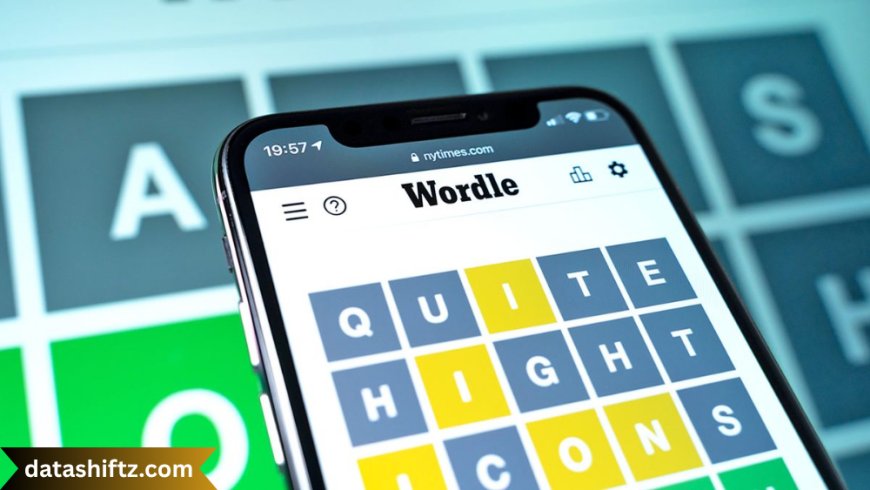Wordle Hints: Mastering the Game One Letter at a Time

Introduction
Wordle has become one of the most popular daily puzzles on the internet, drawing in millions of players around the globe. This simple yet addictive word game challenges players to guess a five-letter word in just six attempts. With only minimal feedback—colored tiles indicating letter accuracy—players must rely on logic, vocabulary, and strategy to succeed. For those who want to sharpen their skills or beat the puzzle faster, Wordle hints can make all the difference.
In this blog post, we dive deep into the world of Wordle hints. We’ll explore the game's rules, provide useful strategies, share daily hint formats, and even offer a guide for beginners and pros alike. Whether you’re new to the game or looking to improve your win streak, this guide is your go-to resource.
Understanding Wordle – A Brief Overview
What Is Wordle?
Wordle is a word-based logic puzzle game created by software engineer Josh Wardle. It offers a fresh challenge every day, giving players six tries to guess a secret five-letter word.
The game provides feedback for each guess using three colors:
-
Green: Correct letter, correct position.
-
Yellow: Correct letter, wrong position.
-
Gray: Letter not in the word.
Why Is Wordle So Popular?
-
Simplicity: Easy to understand, hard to master.
-
Social Sharing: Players can share results without spoilers.
-
Mental Exercise: Engages vocabulary and critical thinking.
-
Limited Plays: Only one puzzle per day increases anticipation.
Daily Wordle Hints and How to Use Them
What Are Wordle Hints?
Wordle hints are clues given to players to help them deduce the correct word without giving it away directly. They can include:
-
Letter position guides
-
Vowel or consonant clues
-
Thematic clues (e.g., “related to weather”)
Sample Wordle Hint Structure
Here's a typical format used in blogs or forums that give hints:
| Hint Type | Sample Clue |
|---|---|
| General Theme | The word relates to music. |
| Starting Letter | The word starts with S. |
| Ending Letter | The word ends with G. |
| Number of Vowels | The word contains two vowels. |
| Tricky Letter Position | The third letter is a consonant. |
Example Wordle Hint for a Sample Puzzle
| Category | Hint Example |
|---|---|
| Theme | Something found in nature |
| First Letter | Starts with “B” |
| Contains Vowel | Includes “E” |
| Tricky Letter | Has a double letter |
| End Letter | Ends in “D” |
| Common Mistake | Often confused with “BREAD” |
Tips and Strategies for Winning Wordle
Proven Strategies to Use in Wordle
-
Start with a Balanced Word
-
Begin with a word that has a mix of vowels and consonants (e.g., “SLATE”, “CRANE”).
-
-
Avoid Repeating Letters Initially
-
In your first guess, try not to repeat letters to increase data coverage.
-
-
Use Process of Elimination
-
Gray letters? Don’t use them again. They’re not in the solution.
-
-
Watch for Common Endings
-
Common suffixes like “-ING”, “-ED”, or “-ER” can narrow your guesses.
-
-
Use Plurals Carefully
-
Wordle typically avoids simple plurals ending in “S”.
-
-
Track Green and Yellow Letters
-
Yellow means the letter is in the word but not in that spot—move it!
-
-
Keep Your Guess Logical
-
Don’t guess obscure words unless absolutely necessary.
-
Tools and Resources for Wordle Players
Helpful Wordle Assist Tools
| Tool | Purpose |
|---|---|
| Wordle Solver | Helps suggest possible words based on input |
| Word Finder Apps | Lists words based on entered constraints |
| Vocabulary Builders | Improves your five-letter word arsenal |
| Online Forums | Daily hints and discussions with other players |
Wordle Variants and Spinoffs
Other Games Inspired by Wordle
| Game | What’s Different |
|---|---|
| Quordle | Guess 4 Wordles at once in 9 tries |
| Octordle | 8 Wordles in 13 tries |
| Nerdle | Math-based version using equations |
| Worldle | Geography-based puzzle |
| Heardle | Guess the song based on short audio clips |
Common Wordle Pitfalls and How to Avoid Them
Frequent Mistakes by Players
-
Not Using the Feedback Properly
-
Ignoring yellow letters is a missed opportunity.
-
-
Guessing Randomly Without Logic
-
Stick to words that follow the pattern you’ve established.
-
-
Getting Emotionally Attached to a Word
-
Don't waste multiple guesses on a "gut-feeling" word.
-
-
Panicking on the 5th or 6th Attempt
-
Stay calm and think critically using elimination.
-
-
Not Learning from Past Puzzles
-
Keep track of past answers to understand patterns and common words.
-
Educational Benefits of Playing Wordle
How Wordle Enhances Cognitive Skills
-
Vocabulary Expansion: Exposes players to new and lesser-known words.
-
Pattern Recognition: Develops logical thinking and sequencing.
-
Spelling Practice: Strengthens spelling accuracy and letter awareness.
-
Memory Improvement: Enhances short-term memory and recall abilities.
Frequently Asked Questions (FAQ)
Common Wordle-Related Questions
-
Is Wordle free to play?
Yes, Wordle is free on the New York Times website. -
Can I replay previous Wordles?
No, officially only one puzzle per day is allowed. But third-party sites have archives. -
What happens if I don’t solve the word?
You can try again the next day—there’s no penalty beyond missing that puzzle. -
Can I play Wordle on mobile?
Yes, Wordle is mobile browser compatible. No app is required. -
Is there a language version of Wordle?
Yes, Wordle has inspired versions in Spanish, Hindi, French, and more.
Conclusion
The charm of Wordle lies in its simplicity. It requires no flashy graphics, no complex storyline—just pure brainpower and a love for language. By using strategic Wordle hints, daily practice, and logic-driven guesses, you can significantly increase your chances of solving the puzzle every time.
Whether you're a Wordle novice or a streak-hunting expert, the joy of that green tile turning up on the final guess is unmatched. So bookmark your favorite hint resources, refine your strategies, and make every guess count.






























